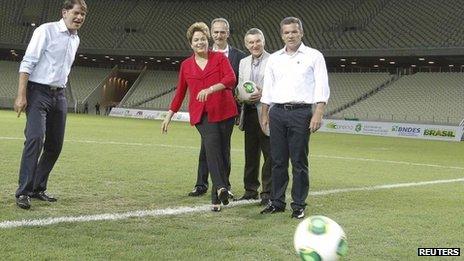Brazil opens first World Cup 2014 stadium
- Published

Brazil has inaugurated the first of 12 stadiums being built or extensively renovated to host the 2014 World Cup.
President Dilma Rousseff kicked a ball during the ceremony at the Castelao Arena in Fortaleza.
Football's world governing body, Fifa, had repeatedly expressed concern over World Cup delays, including at Rio de Janeiro's Maracana stadium.
Castelao and the Maracana are among six venues that must be ready to host Fifa's Confederations Cup next June.
The Castelao Arena, with a capacity of some 65,000, was renovated at a cost of $250m (£155m).
"This is a very special day for us at Fifa because it marks the two great events that will take place in Brazil in the coming years, the Confederations Cup and the World Cup," Fifa President Sepp Blatter said in a recorded message.
Ms Rousseff said the inauguration of Castelao and the success of Sao Paulo football team Corinthians in the Club World Cup final showed Brazil was able to perform off and on the pitch.
Next week, the Minerao Stadium in Belo Horizonte is due to be opened, after a complete refurbishment.
Fifa has extended the December 2012 deadline, giving local organisers until mid-April to have the six stadiums, including the Maracana, ready for the two-week Confederations Cup.
In recent years, Fifa officials have criticised Brazilian preparations with General Secretary Jerome Valcke at one point saying Brazil needed "a kick up the backside."
But in recent weeks, Fifa officials have sounded more upbeat, saying that they expect all 12 stadiums to be ready on time.
Mr Valcke said in November that the six grounds hosting the Confederations Cup - a tournament seen as a dress rehearsal for the World Cup - would meet the deadline.
"We [Fifa and Brazil] have found a way to work together," said Mr Valcke.
Thousands of workers are busy at the Maracana and other stadiums.
Of wider concern is the upgrade of the general infrastructure, including renovation of Brazil's airports, building new public transport, and ensuring there are sufficient hotel rooms.
- Published27 November 2012
- Published17 August 2012
- Published1 December 2012
- Published26 September 2012
- Published17 September 2012